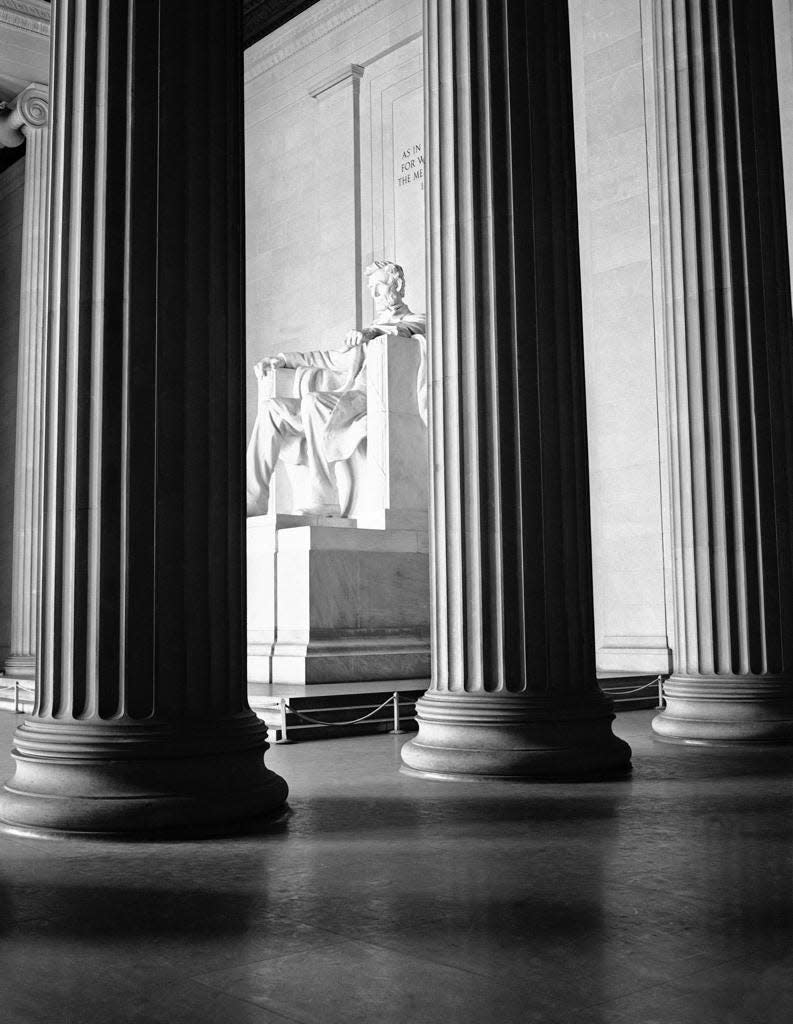My Take: How will you make America great again?

- Oops!Something went wrong.Please try again later.
The original Declaration of Independence rests within a frame made of pure titanium that’s coated with gold.
The glass enclosing it is tempered, laminated and calibrated to a thickness of three-eighths of an inch to block out harmful UV light. And 70 bolts around the frame apply 300 pounds of pressure per linear inch sealing it in.
Inside the frame, parchment made from 1776, sits atop a perforated aluminum platform so that moisture reaches the back to keep it supple. All the while inert argon kept at approximately 40 percent humidity and 60 degrees Fahrenheit staves off the oxidation process.
And most grandiose of all the case housing the Declaration, along with the Constitution and the Bill of Rights, are lowered beneath the ground every night into a custom-built vault made to withstand a nuclear blast.
But despite these advances for preservation and security of parchment and ink the ability to detect problems is growing faster than the ability to solve them. And, most important, figuring out what to do if a problem arises.
And so it is with us.
Though our concern reside not with the preservation and security of fading parchment and ink, but with preserving and securing within the hearts and minds of the people a readiness to: reexamine, reimagine and reinterpret our nation's founding principles when the guarantee of "life, liberty and the pursuit of happiness" becomes crooked, narrow, and hell-bent on making America great again in the name of me the people instead of we the people.
What, then, shall we do?
I'd like to suggest American Scripture.
On Nov. 19, 1863, President Abraham Lincoln would use only 272 words for delivering his Gettysburg Address. The speech, lasting just two minutes, would enter the lexicon of American Scripture as one of the most powerful and concise statements of freedom our nation has ever heard.
Drawing upon his unwavering quest for pursuing the true spirit of our nation’s founding creed, President Lincoln would posit a new vision for America amidst the chaos and rancor of a civil war. Standing, thus, on the bloodstained fields of Gettysburg, Pennsylvania Lincoln would say:
"Four score and seven years ago our fathers brought forth on this continent, a new nation, conceived in Liberty, and dedicated to the proposition that all men are created equal. ... Now we are engaged in a great civil war, testing whether that nation, or any nation so conceived and so dedicated can long endure."
Lincoln would continue on,
"But, in a larger sense … it is for us … to be here dedicated to [this] unfinished work thus far so nobly advanced. ... It is for us to be here dedicated to the great taskremaining before us. [That] this nation, under God, shall have a new birth of freedom."
Lincoln’s invitation to participate in the nation's unfinished work of equality would, indeed, usher in a new birth of freedom rooted in the sentiment that American exceptionalism include those pushed to the very margins of society. And that to truly make — and keep America great — this exceptionalism is incumbent upon each and every citizen-patriot of this nation to pursue not only their individual liberties but also the unalienable rights of others endowed by their Creator no matter their race, color, national origin, religion, sex, marital status, etc.
Or, quite simply: Love your neighbor as yourself.
In the mind, heart and hands of President Lincoln the Declaration of Independence became a living document willing to inspire faith, hope and love of country for the common good whilst confronting conspiracy, secession, insurrection and rebellion against the union of the United States government.
Are you picking up what I’m putting down here?
Ultimately, the authority for preserving and securing the principles of the Declaration rests not just in the hands of presidents and politicians but also the people. Which brings me back to where I began: with parchment and ink and what to do?
There were 56 founders willing to sign their name to the Declaration of Independence. Chief among them were Thomas Jefferson, John Adams, Benjamin Franklin and the like. The first, however, was John Hancock with his signature best remembered for being the largest and most flamboyant over all the rest.
Anecdotes from American folklore suggest that Hancock wrote in such a manner as to make his defiance against King George III more than obvious to the naked eye, but no historical document remains describing why he did this. But what we do know is this: Someone had to go first and pave the way for the others.
How will you make America great again?
— Nick Brock is executive director of Vote Common Good: West Michigan.
This article originally appeared on The Holland Sentinel: My Take: How will you make America great again?
